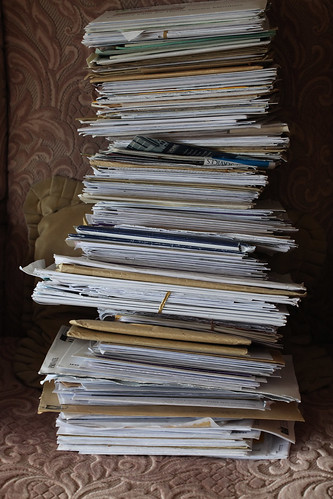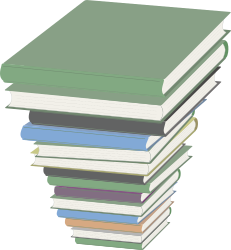Creativity is chaotic by nature. Inspiration may strike at any time, even when it's inconvenient, and you may think of the ending for a book long before you come up with a viable beginning. Sometimes, a setting might strike you first and you end up building a story around it. No matter what your process might be, staying organized is the only way you're going to write a book without making yourself completely crazy (or turning your book into a big mess).
How to Do It
Ideas don't arrive in a neat, orderly fashion, and all the pieces of a book probably aren't going to come together in order. That means you have to make notes as they come to you, and figure out how all of them come to together while you're writing. If you're unorganized, you're going to lose your great ideas. You're going to have trouble finding all your notes and remembering all your information, and wind up wasting a bunch of time looking back through your book to figure it all out. The more time you spend looking for some bit of information or note, the less time you spend writing. Organize your book materials neatly, and you'll end up with a much more cohesive story.
- People, places and things. Before you ever start writing, it's a good idea to create separate files for your outline and character sheet. I'm a firm believer in the pre-plotted outline, but lots of authors like to fly by the seat of their pants. Whichever way you want to do it, create an outline anyway. Once you're done with a chapter, start filling in the outline with the main events. Why do this? If you need to know what happens when, it's a lot quicker to look at the outline than to scroll through your manuscript in an attempt to find it. The character sheet will help you keep track of everyone's names, likenesses and pertinent information -- and it's invaluable.
- Filing. Where on your hard drive are you storing your book files? If they're spread out across different directories, you're just making more work for yourself. Put all your files together, both text- and image-based, in a single folder. The folder's title? The name of the book! It sounds simple, but lots of people store their text and image files separately. When it comes to your book, just keep everything together and save yourself a lot of stress and clicking around.
- The manuscript. Don't store your manuscript in a bunch of different files. I used to open a new file for each and every chapter, and it was a horrifically bad idea. The first few books I wrote had titled chapters, so guess what I ended up with? That's right: a folder full of document files with delightfully random names. Searching for specific scenes was a nightmare. Use just one file for the whole manuscript; this will make ebook formatting and writing much, much easier.
- Physical materials. Just in case you're not confined to your laptop like I am and you actually put together some physical items for your book, you're going to want to put your hands on them easily. You might have handwritten notes, printed images -- I don't know what you've got. But if it's attached to your book, you've got to keep it organized wisely where you can get to it. Where? In a folder, of course! They don't just exist electronically. Put all that stuff together in a folder or a binder, and keep it close to your writing space so you can access it any time. Don't keep anything else in the folder or binder but the stuff for your book. When you start a new book, get a new folder! Write the name of the book on the outside with marker (or use a label if you're fancy) and you're ready to write.
- Time to write. Staying organized means making time to actually write the book, too. Lots of indie authors have families, full-time jobs, responsibilities and social lives. Squeezing time in to write can be difficult (and I struggle with it all the time). Set aside a couple of hours every day, or a full day each week, that's just for writing time. Organize your schedule to make it work, and try to pay attention to when you're feeling most creative and when you get your best writing done. Make writing one of your scheduled responsibilities.
- Stay neat. Keep your writing area neat and organized overall, and make sure the files and folders on your computer are sensibly organized as well. Your space has to have order to it as well. A chaotic environment isn't the best space for being creative, because it's distracting. If you're going to write, you need to be able to access all your materials quickly and you can't do that in a messy space. I'm not telling you to dust and disinfect every day, but at least try to keep everything in manageable piles to maintain some semblance of order. It will be much easier to get work done, you'll see!
Control the chaos, and it's much easier to create. Your mind and your ideas are probably going to be chaotic. When you stay organized about it, you're in a much better position to do something wonderful with them.

























